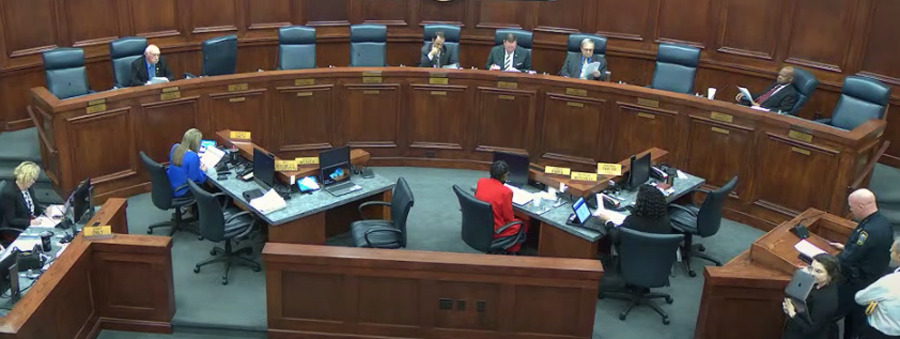
If people find egregious conduct by a member of the Hamilton County, Tenn., commission, ouster is a way to remove that man based on suit filed by 10 citizens and taken to a judge for disposition, with a trial by jury if facts are in dispute. (Photo county commission)
If you and your friends feel a strong need to oust a city, county, utility or other local official, the ouster law is a powerful set of pliers with which to pry the cancerous persona from the body politic.
What follows is my reading of the the relevant law and cases in Tennessee.
The general assembly alone can remove state officers such as DAs and judges for misdeed. That process is called impeachment. It’s not in the hands of ordinary people to run a removal by impeachment.
City, county and other government actors in positions of trust, however, can be removed by a committee of 10 “citizens and freeholders” under the ouster law.
***
“The object of the removal of a public officer for official misconduct is not to punish the officer, but to improve the public service, and to free the public from an unfit officer.” State ex rel. Timothy v. Howse, 134 Tenn. 67, 183 S.W. 510, 513 (1916). The ouster law lets authorities and members of the public to “rid the public of an unworthy servant, and is in this particular entirely different from common-law proceedings criminal in nature.” State v. Howse, 132 Tenn. 452, 178 S.W. 1110, 1112 (1915)
The grounds for ouster are as follows:
Every person holding any office of trust or profit, under and by virtue of any of the laws of the state, either state, county, or municipal, except such officers as are by the constitution removable only and exclusively by methods other than those provided in this chapter, who shall knowingly or willfully commit misconduct in office, or who shall knowingly or willfully neglect to perform any duty enjoined upon such officer by any of the laws of the state, or who shall in any public place be in a state of intoxication produced by strong drink voluntarily taken, or who shall engage in any form of illegal gambling, or who shall commit any act constituting a violation of any penal statute involving moral turpitude, shall forfeit such office and shall be ousted from such office in the manner hereinafter provided.
Tenn. Code Ann. § 8-47-101 (emphasis added)
Accusations in your proposed case must be toward knowing and willful misconduct, but may other grounds such as moral turpitude or illicit personal gain or profit, or lesser grounds such as mistake.
The standard for removal is high. “Where a sheriff has made and honest and reasonably intelligent effort to do his duty, he will not be removed from office by the courts, though his efforts may not have been wholly successful, for his right to hold and continue in office depends upon the good faith of his efforts rather than upon the degree of his success.” State ex rel. v. Reichman, 135 Tenn. 653, 188 S.W. 225, Ann.Cas.1918B, 889.
“These cases also tell us that a plaintiff in an ouster suit shoulders a heightened burden of proof. Tennessee ex rel. Thompson v. Walker, No. 01A01–9311–CR–00486, 1994 WL 164144, at *15 (Tenn.Ct.App. May 4, 1994).” State ex rel. Carney v. Crosby, 255 S.W.3d 593, 597 (Tenn. Ct. App. 2008).
“Public officials occupying offices of trust may be removed from office pursuant to the Ouster Law, Tenn.Code Ann. § 8–47–101, et seq., pursuant to criteria and a framework established by the General Assembly years ago. That framework, however, provides a very high threshold for the removal of an official from a public office. For example, as the Attorney General noted in an opinion, ‘an indictment is not a ground for removal under the Ouster Law.’ Op. Tenn. Atty. Gen. 79–073 (March 22, 1979). (footnote omitted). However, ‘[m]isconduct that would sustain an indictment under the common law would support a proceeding under the Ouster Law.’ ” Id. State ex rel. Carney at 596 (internal citations omitted).
“Proceedings under the Ouster Act should never be brought unless there is a clear case of official dereliction. This is a very drastic statute and should not be invoked except in plain cases that can be certainly proved. There is no excuse for instituting an ouster suit for purposes of inquisition and as a fishing expedition” State ex rel. Wilson v. Bush, 141 Tenn. 229, 208 S.W. 607 (1919). “To oust reputable officer, his official derelictions should amount to knowing misconduct or failure to perform duties, and mere mistakes in judgment will not suffice. Williams’ Code, § 1877.” Vandergriff v. State ex rel. Davis, 185 Tenn. 386, 206 S.W.2d 395 (1937). “To constitute misconduct that is willful or knowing so as to warrant ouster of a public official, the public official’s conduct must exceed simple negligence.” Commissioners of Powell-Clinch Util. Dist. v. Util. Mgmt. Rev. Bd., 427 S.W.3d 375 (Tenn. Ct. App. 2013)
The law targets gross acts of commission and omission by one in an office of trust.
In Jordan v. State, 217 Tenn. 307, 397 S.W.2d 383 (1965), this Court approved the following definition of knowingly and wilfully as used in the ouster statutes:
“The words ‘knowingly and willfully’ also are not confined to a studied or deliberate intent to go beyond the bounds of the law but also encompass a mental attitude of indifference to consequences or failure to take advantage of means of knowledge of the rights, duties or powers of a public officer (sic) holder.” Id. at 398, 397 S.W.2d 383.
State ex rel. Leech v. Wright, 622 S.W.2d 807, 817 (Tenn. 1981) (emphasis added)
The indifference cited in State ex rel. Leech is actionable, and is reckless disregard of duty and of the rights of the citizenry. “The terms ‘malfeasance’ and ‘neglect of duty’ are comprehensive terms and include any wrongful conduct that affects, interrupts, or interferes with the performance of official duty.” State v. Ward, 163 Tenn. 265, 43 S.W.2d 217, 219 (1931). “The statute was intended as a remedy for the removal of public officers for willful official misconduct or willful neglect of official duty and for certain acts involving moral turpitude. It is not insisted that the defendant’s acts involved moral turpitude or that he willfully neglected to perform any official duty, but that he was guilty of violating a statute.” State v. Perkinson, 159 Tenn. 442, 19 S.W.2d 254, 255 (1929).

